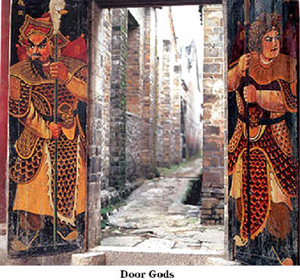Lunar New Year's Eve
 |
New Year's Eve is the time to put up new Spring Festival couplets for the coming year. Spring Festival couplets consist of two paper scrolls, inscribed with auspicious sayings, pasted vertically on either side of the door. A shorter horizontal scroll is often pasted across the top. Like images of door gods, Spring Festival couplets were thought to protect the household from evil. According to ancient Chinese folk beliefs, ghosts and demons fear peach wood. Protective charms made of peach wood boards were therefore traditionally hung on either side of the door during the Lunar New Year festival. Later, images of the door gods Shen Tu and Yu Lei were painted on these boards.
During the Five Dynasties Period, Meng Chang, the king of Shu, ordered the scholar Xin Yinxun to copy some of the king's poetry onto a peach wood door charm. However, Xin Yinxun did not approve of the king's literary effort, and instead inscribed the following lines of his own: "The New Year is filled with holiday cheer; celebrations proclaim the coming of Spring." This was China's first Spring Festival couplet. By the time of the Ming Dynasty, Spring Festival couplets were popular throughout Chinese society. Some examples of popular couplets for Spring Festival are: "Another year passes above and below; Spring brings blessings to Heaven and Earth"; "Good fortune as deep as the Eastern Sea; long life as staunch as the Southern peaks"; "Firecrackers sound and the old year flees; the new year is welcomed through ten thousand doors."
 0
0 







Go to Forum >>0 Comments